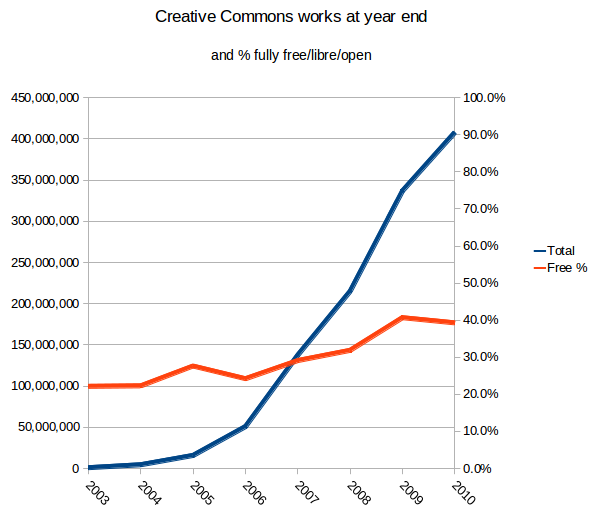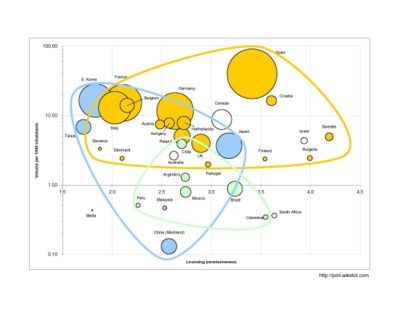Copyriot writes that on Wednesday 11 March the Technical Museum in Stockholm will be hosting a panel discussion on the suggested Ipred-law. Wish I was in Stockholm in time for this event.
Copyright
Comedy and copyright violation
Copyright violation has been linked to terrorism before and it was a stupid then as it is now. Can you imagine terrorists sitting in caves in Afghanistan downloading stuff from the Pirate Bay to destroy western civilization? This is such far fetched propaganda that it should just be seen as excellent comedy – if it wasn’t being proposed by “serious” people and will eventually believed by people in power. Scary.
From Infocult:
Linking copyright violation and terrorism is back. “Film Piracy, Organized Crime, and Terrorism” (pdf) starts by linking pirates and gangsters, claiming to have found:
The Rand study goes on to leap onto terrorism:
Torrentfreak does a good job of taking this apart. One key piece: the study explicitly conflates counterfeiting and copyright infringement. Also important is the loose linkage between different people, functions, and crimes.
Growth of license use
On his blog Rasmus has a very cool motto that warns the reader not to be too impressed with large numbers:
Multiplication can produce powerful numbers.
But it is a difficult motto to follow since we live in a world where measurability is all important. We want to know, we need to know what is bigger, smaller, cheaper, richer, higher, etc so we measure stuff – constantly. To measure also implies that we compare. Are we getting bigger, better or not?
So every now and then someone asks the inevitable question: but how big is Creative Commons? and I am reminded of the motto above. One of the problems is that we need to measure, we want to measure and yet large numbers lose their meaning and become vague: in Swedish their is a wonderful word for this vagueness ogreppbar which translates as ungripable.
Anyway for those of use that still want to see the numbers Creative Commons has a page on Metrics which attempts to present the data. For example as the first bar chart shows there are now clearly over 130 million copyrighted objects licensed under Creative Commons licenses (personally I think this figure is a bit low…)

The next natural question (for me) is who are these people? That is tricky. But we may gain som insights by looking at the jurisdictional spread of Creative Commons licenses. Keep in mind that their is no limitation for a Frenchman to choose to use a Swedish license while residing in Thailand. Also – the web doesn’t really care about physical geography.

The numbers are fun and interesting. They are indicative of something but remember “Multiplication can produce powerful numbers” you cannot find absolut truth in numbers.
Boyle in Cambridge
James Boyle, author of The Public Domain, writes on Boing Boing:
Just a note to say that I am giving a lecture March 10 at 6pm at London’s RSA on my new book, The Public Domain: Enclosing the Commons of the Mind. The lecture hall is gorgeous — Cory has been a frequent speaker there — it has a fabulous series of paintings on the theme of “Progress” by James Barry, featuring earnest waistcoated men with theodolites and many scantily clad young women whose main hope appears to be that The Progress of Human Culture is going to give them something more substantial to wear than a precariously secured bedsheet. The mural is worth the price of admission alone (free but you must register). Following that I’ll be giving the first Arcadia Lecture at Cambridge on Cultural Agoraphobia and the Future of the Library March 12. Hope to see UK BB’ers at one of these events…
The Public Domain: enclosing the commons of the mind (Thanks, Jamie!)
Wish I could be there.
Sweden voted yes to Ipred
At four pm today, following a long debate in parliament the IPRED legislation (based on the European Union’s Intellectual Property Rights Enforcement Directive (IPRED)) went through. Those in favor claim that the law is necessary to protect the rights of copyright holders by allowing them to demand file-sharers identification data from Internet service providers.
The opponents of the law (in parliament these are the Left and Green Parties) argue that the law is an unfair balance which gives the copyright holders too much power and is not enough to protect users privacy. In addition there is a great concern that the legislation will be abused.
Horrocks cartoon

This cool cartoon has been making the rounds online and I thought it was so cool that I would add it to my blog. IN addition to being a great cartoon it also has the caption “This cartoon is NOT copyright by Dylan Horrocks ’09”
Dylan Horrocks has at least two blogs (here and here) and a website.
Nice one Dylan!
Stallman talks in Oslo
This is a bit of a late heads up but is interesting if you happen to be in Oslo this evening. Richard Stallman will give a talk on “Copyright vs. Community in the Age of Computer Networks – Free software and beyond” at Storsalen, Chateau Neuf (Slemdalsveien 15), Oslo. He will be introduced by Gisle Hannemyr from the Department of Informatics, Gisle will also lead the discussion after the talk.
For those who are not able to leave our screens more information about video streaming is available here.
The pirates King Kong defence
The Pirate Bay trial is into it’s fourth day and is being reported by bloggers, tweeters, reporters and commentators. It is almost impossible to miss this media event. This is also part of the problem since the trial itself has become larger than life and more interesting than the actual law. In reality the participants are less than exciting and the law plods along in its usual manner.
Things worth noting so far:
The prosecutor strangely decided to alter the charges (dropping copying and focusing on making available) – this is not uncommon but it was strange that it should occur on day two after a year of preparations. At the same time this doesn’t alter much even though it may importantly effect the damages that can be awarded.
The decription of the bittorent technology involved was badly explained. This is even more surprising as the prosecutors description of the facts should have been acceptable to all. Instead everyone is left with the impression that the prosecutor and his surrounding team is not tech savvy at all.
One of the defence lawyers used the “King Kong defence” when he stated that the prosecutor must show that the defendant has personally interacted with the copyright infringer. Even many users use aliases like King Kong and may well be in the jungles of Cambodia the prosecutor must show such personal interaction. This is a development of the Chewbacca defense.

Lessig asks for help in Fairy defence
Lessig is asking for help in the Shepard Fairy/AP case. He writes on his blog:
As mentioned, the Fair Use Project at Stanford’s CIS is representing Shepard Fairey in his suit against the AP. To that end, we’d be grateful for some net-based knowledge. How many photos are there “like” the beautiful photograph that Mannie Garcia took (the one on the left; the one on the right is a CC licensed photo taken by Steve Jurvetson)? Can you send any examples to shep_use@pobox.com?
Also, please send any favorite examples of photos used as visual references for other works of art. We lawyers don’t know much, but we can learn pretty quickly.
The trial of the decade! Or maybe a non-event?
Tomorrow the long awaited file sharing/internet piracy trial will begin. The Times Online called it the Internet piracy trial of the decade. It’s the Pirate Bay website (or rather four men behind the site) that go on trial for enabling millions of internet users to make illegal downloads of music, movies, games and software. The courts will look into subjects like
– what is a link
– what is a search engine
– aiding criminal offences
Most of the stuff is interesting from a legal-technical point of view since the outcome will hardly have any effect on file sharing on the Internet. The most probably outcome will be a court “victory” for the copyright industry and an appeal to the next level. The case will move towards the inevitable Supreme Court trial. The whole affair should be very interesting and yet, in practical terms, not relevant the total amount of file sharing online. User may have to switch to another provider or service but most probably the Pirate Bay will remain online in some form.
The story so far on ars technica, Times Online, Guardian. Also take a look at the Pirate Bays own dedicated trial site The Spectrial.
To understand how big this is take a look at the torrent user statistics on a map in real time here. Killing a website like the Pirate Bay will not stop this.